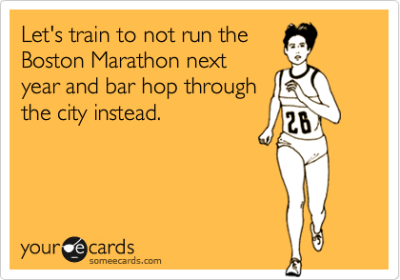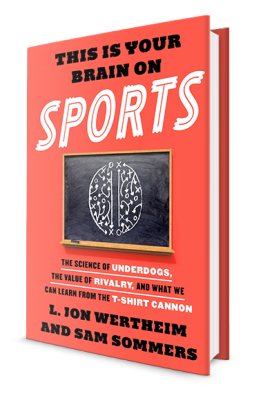The weather in Colorado this weekend is absolutely perfect for all the activities I love. It’s in the 60s at home, and while making a trip to the grocery store I saw dozens of bikers and runners soaking up the sunshine. And if you head out to the mountains, it’s the most insanely perfect bluebird ski day – a big dump of fresh powder last night + gorgeous blue skies and mild temperatures today. Unfortunately, thanks to a dumb cold, I’m stuck home on my couch… so I’m trying to make the best of it by getting some quality reading time.

Perhaps in an effort to glean the lessons of all those awesome activities even though I can’t actually participate right now, I picked up This Is Your Brain on Sports: The Science of Underdogs, The Value of Rivalry, and What We Can Learn From the T-Shirt Cannon. (It’s a pre-release copy that will hit shelves on Tuesday.) It is a really fascinating book! Kind of a sports-themed version of Predictably Irrational – and as I was reading, I found Dan Ariely’s research cited quite often, so the comparison is definitely apt. This Is Your Brain On Sports has a different chapter devoted to each behavioral psychology principle they explored, and then they use examples from multiple sports to illustrate. It’s extremely well-researched, and in addition to various studies cited, the authors have gotten reactions from pro athletes to the surveys. I like that rather than just finding out the science behind it, they also seek reactions from people living in that world – even if those people disagree with science.
One chapter that I found really interesting was on the power of being an underdog, and how telling a false narrative can increase your drive to succeed. Evidently there was an Onion headline a few years back, titled “All 32 NFL Teams Announce They Are Underdogs Headed Into 2010 Season.” While that story may have been a joke, This Is Your Brain On Sports pointed out numerous occasions where athletes/coaches talked about (and even truly) believed their doubts that they would succeed. Some of this is due to the fact that when we’re good at something, it’s hard to understand how others can’t do it, and we think of our own talents as things that obviously everyone has (even when that’s clearly not the case).
But there is a psychological benefit to this tactic as well: if you go into a game thinking of yourself as the underdog, you’re more likely to keep playing and giving it your all until the end rather than giving up halfway through. Fans love to root for underdogs, and players also get an internal boost by feeling like they’ve truly accomplished something against the odds. This really resonated with me from my own experiences running marathons. For me, so much of the thrill of the marathon is wondering if I can finish. I used to be someone who couldn’t run a mile, and when I first started running marathons, it amazed me that I could do it. The feeling of accomplishment was like a drug and I wanted to keep experiencing it over and over. But I think that’s also part of why I’ve stopped running marathons now: I know I can do it, so it’s a lot less exciting to me when I finish one. Maybe at some point I’ll regain that uncertainty if I start pushing for aggressive time goals in races, but for now, time goals for running haven’t held the same allure.

My only criticism is that This Is Your Brain on Sports tended to focus on sports that I think of as spectator sports – football, baseball, basketball, and soccer. (That is to say, those are sports that for the most part tend to be played by professionals by the time you hit adulthood.) There were a few chapters on running, notably one explaining why so many of the best ultramarathon runners tend to be recovering addicts from drugs or alcohol. Since I’m not really an avid sports watcher, I sometimes got lost in the names that were thrown out there as examples, particularly in a chapter on why professional sports team coaches tend to be fired so frequently. I think anyone who’s really into these sports would love the inside view though! And for the rest of us, there are definitely still lessons to be learned – some of the lists of examples were just a tiny bit slow for me, since I didn’t know the people to whom they were referring.
On the bright side, since the book is about behavioral psychology, the lessons in it are broadly applicable to a lot of areas of life – and that’s where This Is Your Brain On Sports really drew me in. The authors do a great job of relating things to business and relationships, and I’m coming away from the book feeling like I’ve learned just as much about human behavior as I took from Predictably Irrational, Thinking Fast and Slow, or Freakonomics (my three favorite books in this genre). Overall, I really enjoyed this book, and would recommend it to any sports lovers or those who like behavioral psychology.

Disclaimer: I received a free advance copy of this book to review; however, I received no other compensation for this post. All opinions are my own.

I hadn’t heard of this book, but it sounds right up my alley. I’ll have to check it out!
You’re welcome to borrow my copy sometime if we’re ever in the same place!
If you’re interested in social psychology as it applies to everyday life, you should read Sommers’s previous book, “Situations Matter.”
Thank you so much for the rec! I am adding it to my future reading list 🙂